肯定句变一般疑问句
- 格式:docx
- 大小:13.21 KB
- 文档页数:2
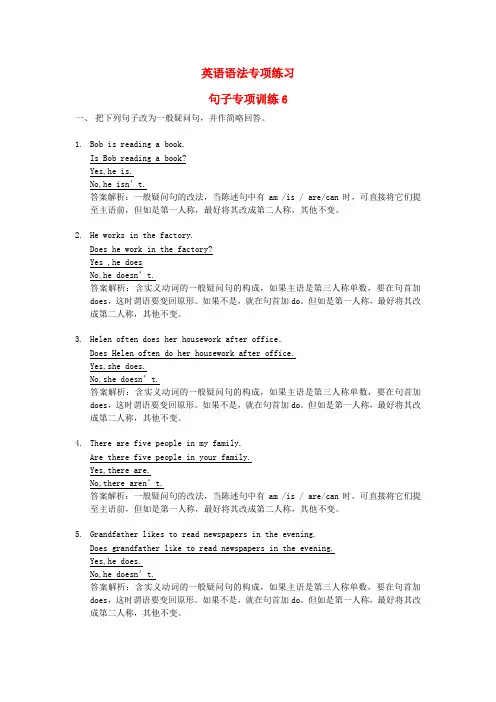
英语语法专项练习句子专项训练6一、把下列句子改为一般疑问句,并作简略回答。
1.Bob is reading a book.Is Bob reading a book?Yes,he is.No,he isn’t.答案解析:一般疑问句的改法,当陈述句中有am /is / are/can时,可直接将它们提至主语前,但如是第一人称,最好将其改成第二人称,其他不变。
2.He works in the factory.Does he work in the factory?Yes ,he doesNo,he doesn’t.答案解析:含实义动词的一般疑问句的构成,如果主语是第三人称单数,要在句首加does,这时谓语要变回原形。
如果不是,就在句首加do。
但如是第一人称,最好将其改成第二人称,其他不变。
3.Helen often does her housework after office.Does Helen often do her housework after office.Yes,she does.No,she doesn’t.答案解析:含实义动词的一般疑问句的构成,如果主语是第三人称单数,要在句首加does,这时谓语要变回原形。
如果不是,就在句首加do。
但如是第一人称,最好将其改成第二人称,其他不变。
4.There are five people in my family.Are there five people in your family.Yes,there are.No,there aren’t.答案解析:一般疑问句的改法,当陈述句中有am /is / are/can时,可直接将它们提至主语前,但如是第一人称,最好将其改成第二人称,其他不变。
5.Grandfather likes to read newspapers in the evening.Does grandfather like to read newspapers in the evening.Yes,he does.No,he doesn’t.答案解析:含实义动词的一般疑问句的构成,如果主语是第三人称单数,要在句首加does,这时谓语要变回原形。
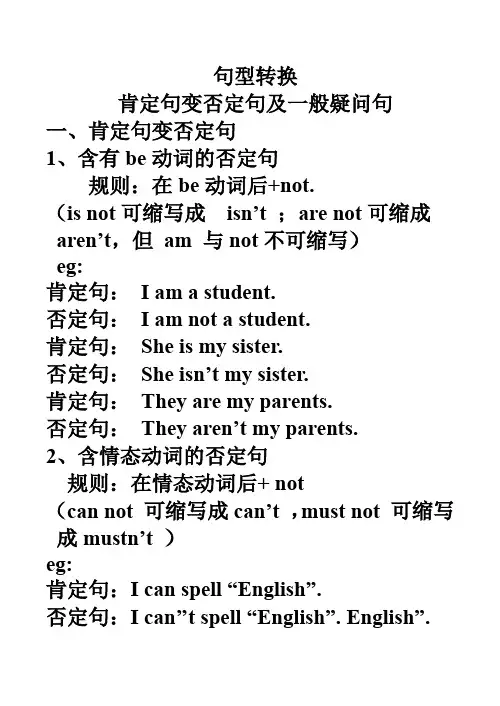
句型转换肯定句变否定句及一般疑问句一、肯定句变否定句1、含有be动词的否定句规则:在be动词后+not.(is not可缩写成isn’t ;are not可缩成aren’t,但am 与not不可缩写)eg:肯定句:I am a student.否定句:I am not a student.肯定句:She is my sister.否定句:She isn’t my sister.肯定句:They are my parents.否定句:They aren’t my parents.2、含情态动词的否定句规则:在情态动词后+ not(can not 可缩写成can’t ,must not 可缩写成mustn’t )eg:肯定句:I can spell “English”.否定句:I can’’t spell “English”.English”.肯定句:I must find it.否定句:I mustn’t find it.3、含有实义动词的句子的否定句构成(1)第三人称单数做主语。
(he、she、it或表示单个人或物的第三人称名词)规则:要在行为动词前加上助动词doesn’t,然后将动词恢复原形。
eg :肯定句:He has a soccer ball.否定句:He doesn’t have a soccer ball.(2)其它人称做主语规则:在行为动词前加don’t ,句子中的行为动词用原形。
eg:肯定句:They like bananas.否定句:They don’t like bananas.注:(1)在变否定句时,如遇some应变any Here are some books.Here aren’t any books.二、肯定句变一般疑问句1、含有be动词的句子变一般疑问句规则:把be动词提至句首,第一人称变第二人称,句末句号变问号。
(I/we变成youMy/our变成your)肯定句:I am a student.一般疑问句:Are you a student?肯定句:She is my sister.一般疑问句:Is she your sister?肯定句:They are my parents.一般疑问句:Are they your parents?2、含有情态动词的句子变一般疑问句规则:把情态动词提至句首,第一人称变第二人称,句末句号变问号。
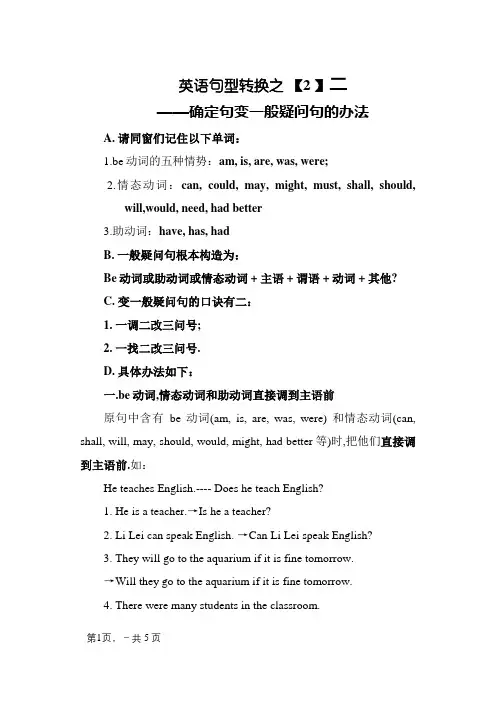
英语句型转换之【2 】二——确定句变一般疑问句的办法A. 请同窗们记住以下单词:1.be动词的五种情势:am, is, are, was, were;2.情态动词:can, could, may, might, must, shall, should,will,would, need, had better3.助动词:have, has, hadB. 一般疑问句根本构造为:Be动词或助动词或情态动词 + 主语 + 谓语 + 动词 + 其他?C. 变一般疑问句的口诀有二:1. 一调二改三问号;2. 一找二改三问号.D. 具体办法如下:一.be动词,情态动词和助动词直接调到主语前原句中含有be动词(am, is, are, was, were) 和情态动词(can, shall, will, may, should, would, might, had better等)时,把他们直接调到主语前.如:He teaches English.---- Does he teach English?1. He is a teacher.→Is he a teacher?2. Li Lei can speak English. →Can Li Lei speak English?3. They will go to the aquarium if it is fine tomorrow.→Will they go to the aquarium if it is fine tomorrow.4. There were many students in the classroom.→Were there many students in the classroom?二.原句中没有be动词.助动词或情态动词时,要依据下面不同情形在主语前加助动词do, does, did.1. 句中第一个动词是本相时,在主语前加上do.如:I get to school at six o'clock every day.→Do you get to school at six o'clock every day?2. 句中第一个动词是三单情势时,在主语前加上does,本来的动词三单情势改为动词本相.如:He teaches English.→Does he teach English?3. 句中第一个动词是曩昔式时,在主语前加上did,本来的动词曩昔式改为动词本相.如:The children had a good time in the park last night.→Did the children have a good time in the park last night?三.确定句变一般疑问句的几点留意1. 确定句变一般疑问句时,除上述变化外,句中其他词语也可能随之转变,如将some改为any,something改为anything, my改为your, I改为you,already.still改为yet等.如:There are some apples in the tree..→Are there any birds in the tree?The dentisthas already seen the moive.→Has the dentist seen the moive yet?2. 须要分清do, does, did, have, has, have, had等是实义动词照样助动词.假如是助动词,则把它们直接调到主语前,假如是实义动词,则在主语前面依据现实情形加do, does或did.如:Mary usually does some readingon Saturdays.→Does Mary usually any readingon Saturdays?(Wrong)→Does Mary usually do any readingon Saturdays?(Right)I have taught English here for two years→Do you have taught English here for two years?(Wrong)→Have you taught English here for two years?(Right)演习题一.填空,把下面的句子变成一般疑问句:1. She is doing some cleaning._____ she doing ________ cleaning?2. They were watching TV at this time yesterday._____ they ________ TV at this time yesterday?3. She goes bicycling twice a week.______ she _____ bicycling twice a week?4. She has to clean the classroom every day._____ she _____ to clean the classroom every day?5. She does morning exercises every day._____ she _____do morning exercises every day?6. We did morning exercises yesterday._____ you _____ morning exercises yesterday?7. The policeman told the boys not to play football in the street. (甘肃省中考题)______ the policeman ______ the boys not to play football in the street?8. I am from Canada._____ _____ from Canada?9. She is looking for her dog._____ she __________ for her dog?10. They are some knives.______ they ______ knives?11.Maria does sports every day._____ Maria _____ sports every day?12. I would like to go with you.______ you ______ to go with me?二.用do,does,be 填空1. _____ she know all the answers ?Yes , she ____ . /No, she _____.2 ._____ the twins often fight ?3. _____ your dad like listening to music?Yes , he ____ . / No, he_____.4._____ uncle Tom wash his car everyday?5. _____ you have a new teacher?Yes , I ______. No, I ______.6._____ she a teacher?Yes, she _____ . No, she _____.7. ______ you playing ball now?Yes, I ______. No, I ______.8. ______ the pig like to sleep?Yes, it ______. No, it _____.9. ______ five birds flying in the sky?Yes, they _____ .No, ____ aren’t.10. _____ your father smoking in the living room? Yes, ____ is .No, he _____.。
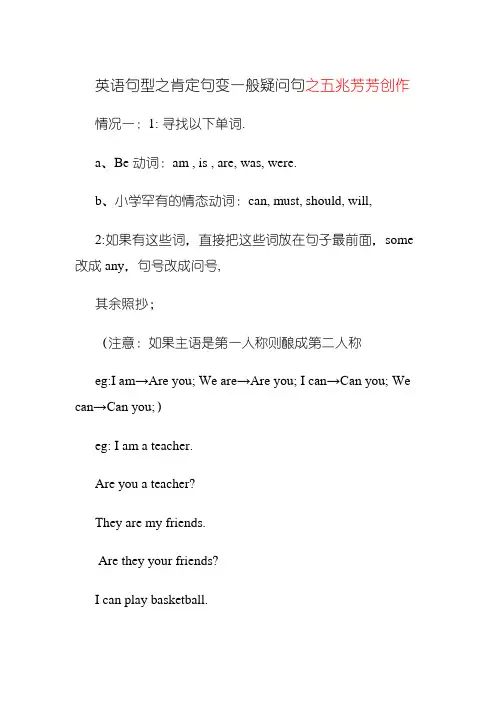
英语句型之肯定句变一般疑问句之五兆芳芳创作情况一:1: 寻找以下单词.a、Be 动词:am , is , are, was, were.b、小学罕有的情态动词:can, must, should, will,2:如果有这些词,直接把这些词放在句子最前面,some 改成any,句号改成问号,其余照抄;(注意:如果主语是第一人称则酿成第二人称eg:I am→Are you; We are→Are you; I can→Can you; We can→Can you;)eg: I am a teacher.Are you a teacher?They are my friends.Are they your friends?I can play basketball.Can you play basketball?My sister is watching TV.Is your sister watching TV?情况二:情况一中单词找不到的句子,在句子前面加助动词do, does,(如何确定助动词用do, does,呢?按照句中动词,动词是原形的就用do, 动词是单三形式的就用does)注意:变疑问句时,句中有some,要将some变成any;句中动词用原形.(如果主语是第一人称则酿成第二人称)eg: I like the monkeys.Do you like the monkeys?My sister has a lovely dog.Does your sister have a lovely dog?I have some bread and milk every morning.Do you have any bread and milk every morning?。
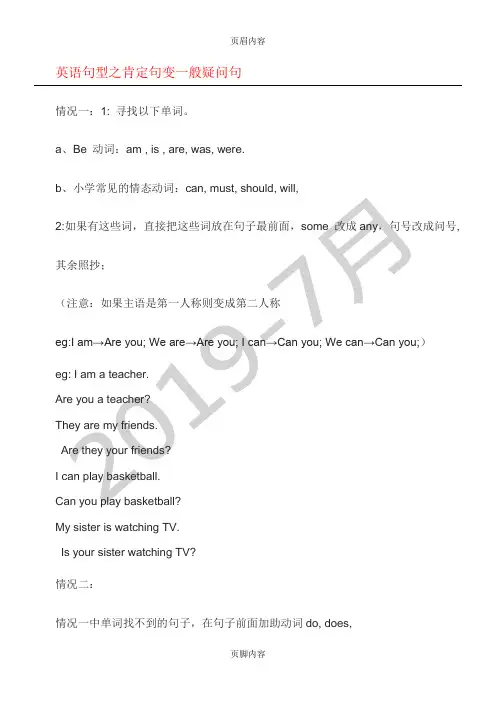
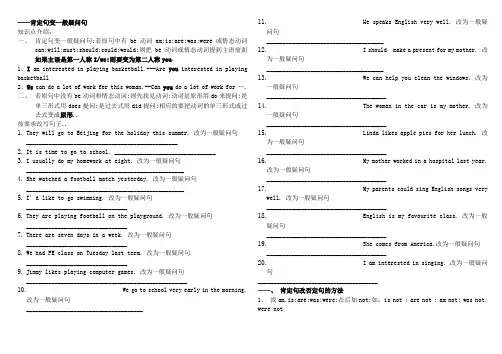
——肯定句变一般疑问句知识点介绍:一、肯定句变一般疑问句;若原句中有be动词am;is;are;was;were或情态动词can;will;must;should;could;would;则把be动词或情态动词提到主语前面如果主语是第一人称I/we;则要变为第二人称you;1、I am interested in playing basketball.---Are you interested in playing basketball2、We can do a lot of work for this woman.--Can you do a lot of work for ….二、若原句中没有be动词和情态动词;则先找见动词;动词是原形用do来提问;是单三形式用does提问;是过去式用did提问;相应的要把动词的单三形式或过去式变成原形..按要求改写句子..1.They will go to Beijing for the holiday this summer. 改为一般疑问句________________________________________________2.It is time to go to school. ________________________________3.I usually do my homework at eight. 改为一般疑问句__________________________________________________4.She watched a football match yesterday. 改为一般疑问句__________________________________________________5.I’d like to go swimming. 改为一般疑问句________________________________6.They are playing football on the playground. 改为一般疑问句________________________________7.There are seven days in a week. 改为一般疑问句________________________________8.We had PE class on Tuesday last term. 改为一般疑问句________________________________9.Jimmy likes playing computer games. 改为一般疑问句___________________________________________________10.We go to school very early in the morning.改为一般疑问句_____________________________________11.He speaks English very well. 改为一般疑问句_____________________________________12.I should make a present for my mother. 改为一般疑问句_____________________________________13.We can help you clean the windows. 改为一般疑问句______________________________________14.The woman in the car is my mother. 改为一般疑问句______________________________________15.Linda likes apple pies for her lunch. 改为一般疑问句______________________________________16.My mother worked in a hospital last year.改为一般疑问句______________________________________17.My parents could sing English songs verywell. 改为一般疑问句______________________________________18.English is my favourite class. 改为一般疑问句______________________________________19.She comes from America.改为一般疑问句______________________________________20.I am interested in singing. 改为一般疑问句______________________________________——、肯定句改否定句的方法1、找am.is;are;was;were;在后加not;如;is not ; are not ; am not; was not; were not2、在情态动词can;will;must;should;could;would等后加not..如:can not3、上述都没有的;在动词前加助动词否定形式do not; does not;did not. don’t/doesn’t/didn’t ;动词变为原形..4、 some 、many改成any..改为否定句1. We are in the same class.____________________________________2. They have some nice kites._______________________________________3. Open the door; please. _______________________________________4. She likes reading books._______________________________________5. We should do our homework at school._________________________________6. They like going fishing._____________________________________-7. She was good at music. ____________________________________8. You are playing basketball. ____________________________________9. I am good at playing football. ____________________________________10. She goes to school every day. ____________________________________11. The lion is sleeping. ____________________________________12. The small monkey likes climbing trees. _______________________________13. They watch TV every Sunday. ____________________________________14.My father can play ping-pong. __________________________________15.We will go to the Great Wall. __________________________________16. She ate fresh food last weekend. __________________________________17.We went to Xinjiang. __________________________________18.I did my homework last weekend. __________________________________------肯定句改特殊疑问句的方法如何把陈述句变成特殊疑问句就划线部分提问:肯定句变特殊疑问句就划线部分提问:分2步骤第一步:将陈述句翻译为汉语;用汉语对划线部分提问;确定特殊疑问词;并写下来..第二步:把陈述句变为一般疑问句;写下来;划线部分去掉..特殊疑问句=特殊疑问词+一般疑问句when 什么时间问时间 what date 什么日期问具体日期who 谁问人whose 谁的问主人 how …怎么样问情况 where 在哪里问地点 how old 多大问年龄 which 哪一个问选择 how many 多少问数量 why 为什么问原因 how much 多少钱问价钱 what 什么问东西how about …怎么样问意见 whattime 什么时间问时间 what colour 什么颜色how long 多长 what about…怎么样问意见 what day 星期几问星期1. That car is yellow. 提示:问颜色 _____ _____ is that car2. My sister is 15 years old. 提示:问年龄 ______ _____ is your sister3. The glasses are Jim’s. 提示:问归属 ______ glasses are these4. Ann cleaned her room last Sunday.提示:问”谁”______ cleaned her room last Sunday5. There were eleven books in my bag.提示: 问数量 ______ ______ books are there in your bag6. I visited my teachers on Teachers’ Day.提示:问时间 _______ did you visit your teachers7. It means “Do not touch”.提示:问”什么” _______ does it mean8. I’m fine; thank you.提示: 问怎么样 ______ are you9. I go to school by bus.提示:问方式 ______ do you go to school10. The panda is black and white. _____ ______ is the panda11. Her kite is under the bed. _____ ______ her kite12. I come to school by bike. _____ _____ you come to school13. Ben has a birthday present. _____ does Ben have14. Mother bought a gift for me. _____ did mother buy a gift for25. This is Ben’s English book. _____ English book is this16. His father is a pilot.对划线部分提问 ______ his father’s ___ ____17. Mr King is from America.对划线部分问 ______ is Mr King _____ ___18. He’s an actor.变为复数 ____ __ are _____ ____.19 I have three cousins.对划线部分提问___________________________20. My birthday is November 11 . __________________________21. He's fine . __________________________22. I go to school by bike . __________________________23. He is twelve. __________________________24. The hamburger is four dollars . __________________________ ------感叹句What +数量词+形容词+词 what a big apple 多么大的一个苹啊How +形容词+主语+be动词 How big the apple is三、所给句子填空;使填空句变为相应的感叹句:1. The boy swam very fast.同义句_______ _______ the boy swam2. The school trip is very exciting. 同义句_____ ______ the school trip is3. Hei Longjiang looks very beautiful in winter.同义句 _______ _______ Hei Longjiang looks in winter4. It is a very cheap dictionary.同义句 _______ _______ _______ dictionary it is_______ _______ _______ dictionary is。
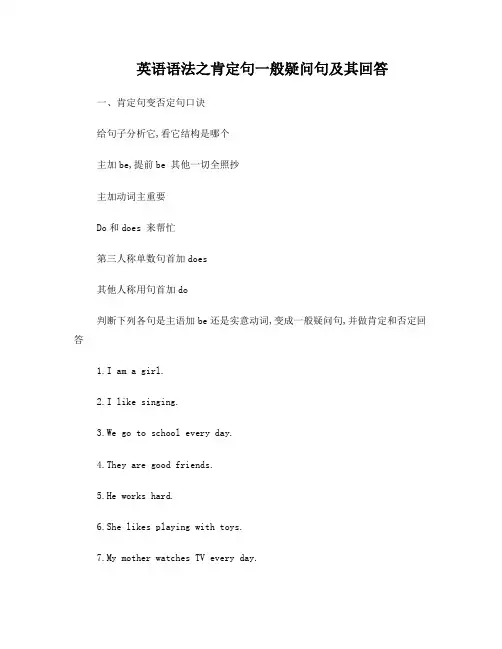
英语语法之肯定句一般疑问句及其回答一、肯定句变否定句口诀给句子分析它,看它结构是哪个主加be,提前be 其他一切全照抄主加动词主重要Do和does 来帮忙第三人称单数句首加does其他人称用句首加do判断下列各句是主语加be还是实意动词,变成一般疑问句,并做肯定和否定回答1.I am a girl.2.I like singing.3.We go to school every day.4.They are good friends.5.He works hard.6.She likes playing with toys.7.My mother watches TV every day.8.You are a beautiful girl.9.Tom is playing football on the playground.10.Bill does his homework after supper.三、肯定句一般疑问句规则肯定句主语+be+其他变成be+主语+其他主语+动词+其他变成Do+主语+动词+其他主语(第三人称单数)+动词单三+其他变成Does+主语(第三人称单数)+动词原形+其他练习:变成一般疑问句,并做肯定和否定回答1.She is watching TV now.2.We go to school on Sunday.3.His father works hard.4.Jack's mother is a nurse.5.The cat runs fast.6.They like reading books.7.My grandpa gives me a hot dog.8.Tom often walks to school.9.I have a doll.10.It is eating fish.一、按要求完成句子(要求:变成一般疑问句,并做肯定和否定回答1. I am a student.→2. They are English cars.、3. This is a pencil-box.4. Its name is Polly.5. Jim is at school.6. These are my English books.7. I know his name.。
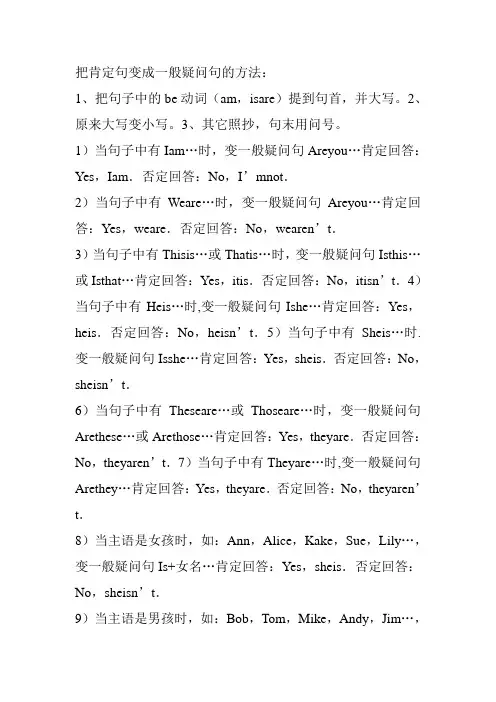
把肯定句变成一般疑问句的方法:1、把句子中的be动词(am,isare)提到句首,并大写。
2、原来大写变小写。
3、其它照抄,句末用问号。
1)当句子中有Iam…时,变一般疑问句Areyou…肯定回答:Yes,Iam.否定回答:No,I’mnot.2)当句子中有Weare…时,变一般疑问句Areyou…肯定回答:Yes,weare.否定回答:No,wearen’t.3)当句子中有Thisis…或Thatis…时,变一般疑问句Isthis…或Isthat…肯定回答:Yes,itis.否定回答:No,itisn’t.4)当句子中有Heis…时,变一般疑问句Ishe…肯定回答:Yes,heis.否定回答:No,heisn’t.5)当句子中有Sheis…时.变一般疑问句Isshe…肯定回答:Yes,sheis.否定回答:No,sheisn’t.6)当句子中有Theseare…或Thoseare…时,变一般疑问句Arethese…或Arethose…肯定回答:Yes,theyare.否定回答:No,theyaren’t.7)当句子中有Theyare…时,变一般疑问句Arethey…肯定回答:Yes,theyare.否定回答:No,theyaren’t.8)当主语是女孩时,如:Ann,Alice,Kake,Sue,Lily…,变一般疑问句Is+女名…肯定回答:Yes,sheis.否定回答:No,sheisn’t.9)当主语是男孩时,如:Bob,Tom,Mike,Andy,Jim…,变一般疑问句Is+男名…肯定回答:Yes,heis.否定回答:No,heisn’t.10)当主语是指物的可数名词单数时,如book,pen,pencil,car,cat…变一般疑问句Is+可数名词单数…肯定回答:Yes,itis.否定回答:No,itisn’t.当主语是指物的可数名词复数时,如books,pens,pencils,cars,cats…变一般疑问句Are+可数名词复数…肯定回答:Yes,theyare.否定回答:No,theyaren’t.11)当主语是AandB时(A和B指物或者人,如dagandcat;TomandBob),变一般疑问句Are+AandB…肯定回答:Yes,theyare.否定回答:No,theyaren’t.12)当主语是BandI时,变一般疑问句AreyouandB…肯定回答:Yes,weare.否定回答:No,wearen’t.13)Thereis…变一般疑问句Isthere…肯定回答:Yes,thereis.否定回答:No,thereisn’t.14)Thereare…变一般疑问句Arethere…肯定回答:Yes,thereare.否定回答:No,therearen’t.。
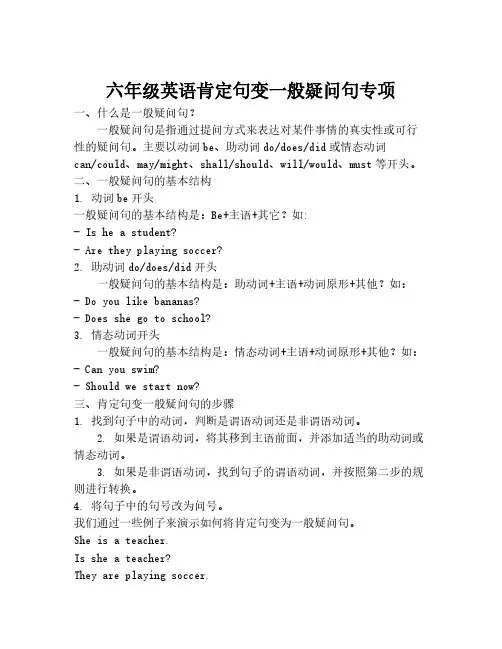
六年级英语肯定句变一般疑问句专项一、什么是一般疑问句?一般疑问句是指通过提问方式来表达对某件事情的真实性或可行性的疑问句。
主要以动词be、助动词do/does/did或情态动词can/could、may/might、shall/should、will/would、must等开头。
二、一般疑问句的基本结构1. 动词be开头一般疑问句的基本结构是:Be+主语+其它?如:- Is he a student?- Are they playing soccer?2. 助动词do/does/did开头一般疑问句的基本结构是:助动词+主语+动词原形+其他?如:- Do you like bananas?- Does she go to school?3. 情态动词开头一般疑问句的基本结构是:情态动词+主语+动词原形+其他?如:- Can you swim?- Should we start now?三、肯定句变一般疑问句的步骤1. 找到句子中的动词,判断是谓语动词还是非谓语动词。
2. 如果是谓语动词,将其移到主语前面,并添加适当的助动词或情态动词。
3. 如果是非谓语动词,找到句子的谓语动词,并按照第二步的规则进行转换。
4. 将句子中的句号改为问号。
我们通过一些例子来演示如何将肯定句变为一般疑问句。
She is a teacher.Is she a teacher?They are playing soccer.Are they playing soccer?He can swim.Can he swim?I like ice cream.Do you like ice cream?We have finished our homework.Have you finished your homework?五、注意事项1. 一般疑问句可以用短答语回答,短答语为"Yes, 主语+动词原形"或"No, 主语+助动词/情态动词+not+动词原形"。
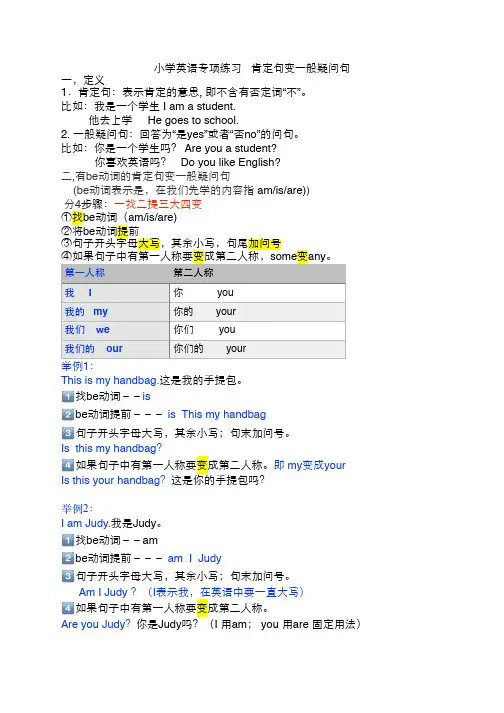
⼩小学英语专项练习肯定句变⼀一般疑问句⼀一,定义1.肯定句:表⽰示肯定的意思, 即不含有否定词“不”。
⽐比如:我是⼀一个学⽣生 I am a student.他去上学 He goes to school.2. ⼀一般疑问句:回答为“是yes”或者“否no”的问句。
⽐比如:你是⼀一个学⽣生吗? Are you a student?你喜欢英语吗? Do you like English?⼆二,有be动词的肯定句变⼀一般疑问句(be动词表⽰示是,在我们先学的内容指am/is/are))分4步骤:⼀一找⼆二提三⼤大四变①找be动词(am/is/are)②将be动词提前③句⼦子开头字⺟母⼤大写,其余⼩小写,句尾加问号④如果句⼦子中有第⼀一⼈人称要变成第⼆二⼈人称,some变any。
第⼀一⼈人称第⼆二⼈人称我 I你 you我的 my你的 your我们 we你们 you我们的 our你们的 your举例1:This is my handbag.这是我的⼿手提包。
!找be动词--is"be动词提前---is This my handbag#句⼦子开头字⺟母⼤大写,其余⼩小写;句末加问号。
Is this my handbag?$如果句⼦子中有第⼀一⼈人称要变成第⼆二⼈人称。
即 my变成yourIs this your handbag?这是你的⼿手提包吗?举例2:I am Judy.我是Judy。
!找be动词--am"be动词提前--- am I Judy#句⼦子开头字⺟母⼤大写,其余⼩小写;句末加问号。
Am I Judy ?(I表⽰示我,在英语中要⼀一直⼤大写)$如果句⼦子中有第⼀一⼈人称要变成第⼆二⼈人称。
Are you Judy?你是Judy吗?(I ⽤用am; you ⽤用are 固定⽤用法)举例3:They are some pens.它们是⼀一些钢笔。
!找be动词--are"be动词提前--- are They some pens#句⼦子开头字⺟母⼤大写,其余⼩小写;句末加问号。
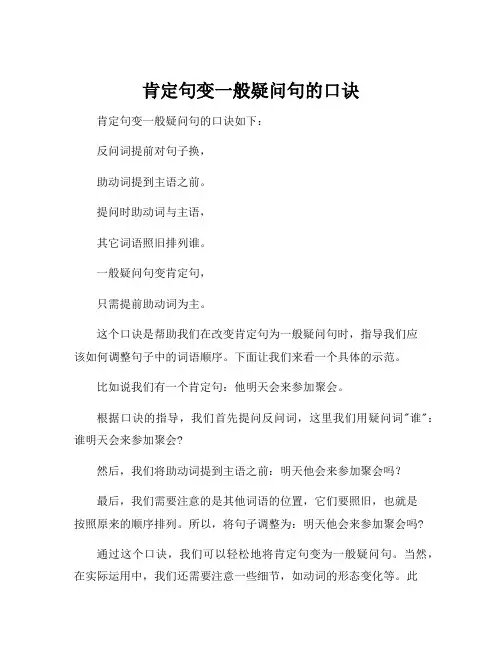
肯定句变一般疑问句的口诀
肯定句变一般疑问句的口诀如下:
反问词提前对句子换,
助动词提到主语之前。
提问时助动词与主语,
其它词语照旧排列谁。
一般疑问句变肯定句,
只需提前助动词为主。
这个口诀是帮助我们在改变肯定句为一般疑问句时,指导我们应
该如何调整句子中的词语顺序。
下面让我们来看一个具体的示范。
比如说我们有一个肯定句:他明天会来参加聚会。
根据口诀的指导,我们首先提问反问词,这里我们用疑问词"谁":谁明天会来参加聚会?
然后,我们将助动词提到主语之前:明天他会来参加聚会吗?
最后,我们需要注意的是其他词语的位置,它们要照旧,也就是
按照原来的顺序排列。
所以,将句子调整为:明天他会来参加聚会吗?
通过这个口诀,我们可以轻松地将肯定句变为一般疑问句。
当然,在实际运用中,我们还需要注意一些细节,如动词的形态变化等。
此
外,还要记住一些特殊疑问词的用法,如"谁"、"什么"、"哪里"等等,它们也需要在合适的位置提前出现。
所以,掌握这个口诀只是我们学习一般疑问句变化的第一步。
通
过反复练习和积累,我们可以更加熟练地运用它,提高我们的语言表
达能力。
希望大家能够善于运用这个口诀,轻松地变换句子类型,让
我们的交流更加生动有趣!。
变一般疑问句,并做肯否回答:1、He is tall.
一般疑问句:
肯/否回答:
2、She is a teacher.
一般疑问句:
肯/否回答:
3、I am a teacher.
一般疑问句:
肯/否回答:
4、They are students.
一般疑问句:
肯/否回答:
5、I can swim.
一般疑问句:
肯/否回答:
6、I play football.
一般疑问句:
肯/否回答:
7、This is his pencil.
一般疑问句:
肯/否回答:
8、This is my handbag.
一般疑问句:
肯/否回答:
9、This is Tim's coat.
一般疑问句:
肯/否回答:
10、He is German.
一般疑问句:
肯/否回答:
11、He is happy.
一般疑问句:
肯/否回答:
12、He can play the guitar.
一般疑问句:
肯/否回答:
13、Mary is your sisiter.
一般疑问句:
肯/否回答:
14、Jim can play basketball.
一般疑问句:
肯/否回答:。
肯定句形成普遍疑问句的要领之阳早格格创做第一步:瞅所给句子的谓语动词汇是可为Be动词汇,是Be 动词汇的,把Be动词汇移搁正在句尾,剩下的照抄,共时将句子中的some 改成any. I 改成you, my改成your, 句面改成问号.如:I am a teacher. →Are you a teacher?She is a student. → Is she a student.第二步,瞅所给句子的谓语动词汇是可为情态动词汇,是情态动词汇的,把情态动词汇can,shall,will等移搁到句尾,剩下的照抄,共时将句子中的some 改成any. I 改成you, my改成your, 句面改成问号.如:I can play basketball. → Can you play basketball?第三步,如果所给句子的谓语动词汇既没有是Be动词汇也没有是情态动词汇,正在句尾请帮动词汇Do/Does/Did帮手,剩下的照抄,共时将句子中的some 改成any. I 改成you, my改成your, 句面改成问号.如: I play computer games everyday.→Do you play computer games everyday?He plays computer games everyday. →Does he play computer games everyday?We played computer games yesterday.→Did you play computer games yesterday?普遍疑问句的回问普遍疑问句有二种回问,即:肯定回问战可定回问.肯定回问用yes,语句程序为:Yes ,主语+ am /is/ are/was/were.|can.|do/does/did|;可定回问用no,语句程序为:No,主语+ am not/ isn’t/ aren’t/wasn't/weren't.|can't.|don't/doesn't/didn't|..如:—Are you an English teacher?→Yes, I am. /No, I am not.—Is that a bird?→Yes, it is./ No, it isn’t.肯定句形成普遍疑问句相闭训练将下列句子改为普遍疑问句,并做肯定战可定回问1. They are singing in the classroom.2. My brother likes going shopping very much.3. There are some apples and oranges in the basket.4. The food can give us energy for having sports.5. I’d like to eat some hamburgers.6.I know the answer.7.We can see some birds.8,There is a computer in my house.9.There are some flowers on the teachers’desk.?。
肯定句变一般疑问句专题
一,什么是肯定句变一般疑问句?
即将一个肯定句改成疑问句,使其能用是或者不是来回答。
二,有哪些题型?
1,句子中有am/are/is/can时,直接提前,将第一人称改为第二人称,句号改成问号。
例: 1, I am a student.
Am I a student?(错,要改成第二人称)
Are you a student?
2, she can play the piano.
Can she play the piano?
2,句中只有实义动词时,看动词形式。
1)如果动词结尾有s/es,句子开头用Does,动词结尾的s/es 去掉,结尾加问号。
例:H e goes to school every day.
Does he go to school every day?
2) 如果动词为原型就用,句子开头Do,结尾加问号。
例:They go to school every day.
Do they go to school every day?
练习:改为一般疑问句
I often go shopping on weekends.
She can draw pictures. He runs to school every day.。
英语句型之肯定句变一般疑问句
情况一:1: 寻找以下单词。
a、Be 动词:am , is , are, was, were.
b、小学常见的情态动词:can, must, should, will,
2:如果有这些词,直接把这些词放在句子最前面,some 改成any,
句号改成问号,
其余照抄;
(注意:如果主语是第一人称则变成第二人称
eg:I am→Are you; We are→Are you; I can→Can you; We
can→Can you;)
eg: I am a teacher.
Are you a teacher?
They are my friends.
Are they your friends?
I can play basketball.
Can you play basketball?
My sister is watching TV.
Is your sister watching TV?
情况二:
情况一中单词找不到的句子,在句子前面加助动词do, does,
(如何确定助动词用do, does,呢?根据句中动词,动词是原形的就
用do, 动词是单三形式的就用does)
注意:变疑问句时,句中有some,要将some变为any;句中动
词用原形。(如果主语是第一人称则变成第二人称)
eg: I like the monkeys.
Do you like the monkeys?
My sister has a lovely dog.
Does your sister have a lovely dog?
I have some bread and milk every morning.
Do you have any bread and milk every morning?